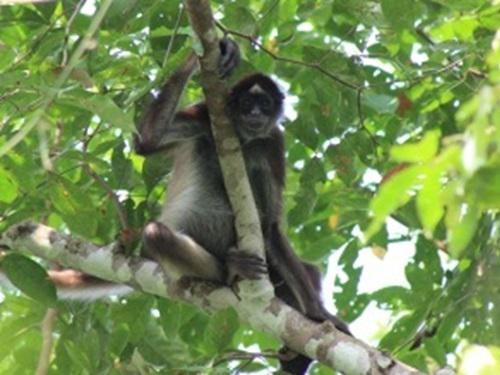Andres Link
Other projects
22 Nov 2007
Effects of Deforestation on the Behavioural Ecology of the Critically Endangered Brown Spider Monkeys (Ateles hybridus) and the Primate Community at Serranía de Las Quinchas, Colombia
This project aims to compare the effects of fragmentation, resource availability and primate population density on the stress levels and parasitism of brown spider monkeys by comparing two habituated populations; one living in an extremely fragmented forest and one living in a forest with minor anthropogenic intervention. These data will build on our current understanding on the status of the remaining wild population of brown spider monkeys and will help to design successful conservation initiatives for these critically endangered primates.

Ateles hybridus.
The proposed project builds on a five-year project (partially funded by RSG Foundation) aimed to provide a better understanding of the effects of forest fragmentation and habitat loss on the behavioural ecology and population biology of the critically endangered brown spider monkey (Ateles hybridus) in Colombia. In particular, we aim to l generate the first in-situ data on the stress levels and patterns of parasitism of two populations of brown spider monkeys in order to provide a better understanding on the proximate effects of habitat intervention on the health of wild brown spider monkey´s populations.
The data and analyses needed to complete the proposed project include:
[1] Collection of behavioural data and faecal samples on two study populations,
[2] an estimation of forest fruit productivity at each site,
[3] hormonal analyses to build cortisol profiles for identified individuals,
[4] parasitic analyses to describe the diversity of parasites in brown spider monkeys and the temporal variation in parasite prevalence and co-infection.
Briefly, this one-year study will focus on two habituated populations of brown spider monkeys living in contrasting socio-ecological scenarios in northern Colombia. We will conduct all day follows on our study groups to record their behaviour and ecology. Biweekly surveys of habitat-wide fruit availability (phenologic surveys) will be conducted using > 6 km of transects.
During follows, we will collect non-invasive faecal samples from which we will conduct hormonal and parasitic assays. To determine individual stress profiles we will analyse faecal glucocorticoid-metabolites attempting to sample every adult and subadult individual at least once every week. On a biweekly basis we will collect faecal samples of each individual for the analysis of gastrointestinal parasites. Prior to laboratory analysis, faeces will be stored in 10% buffered formalin solution. We will compare the results obtained at both sites in order to assess for the influence of resource availability and habitat disturbance on the stress levels and parasite loads of the critically endangered brown spider monkeys.
This project will fill an important gap in our understanding of how habitat disturbance and fragmentation influence the survival and population status of one of the most endangered Neotropical primates. This project will also provide continuity to our long term research and conservation efforts on the remaining wild populations of brown spider monkeys and will continue to train local students and biologists in the fields of primate behaviour conservation in order to build local capacity in Colombia.